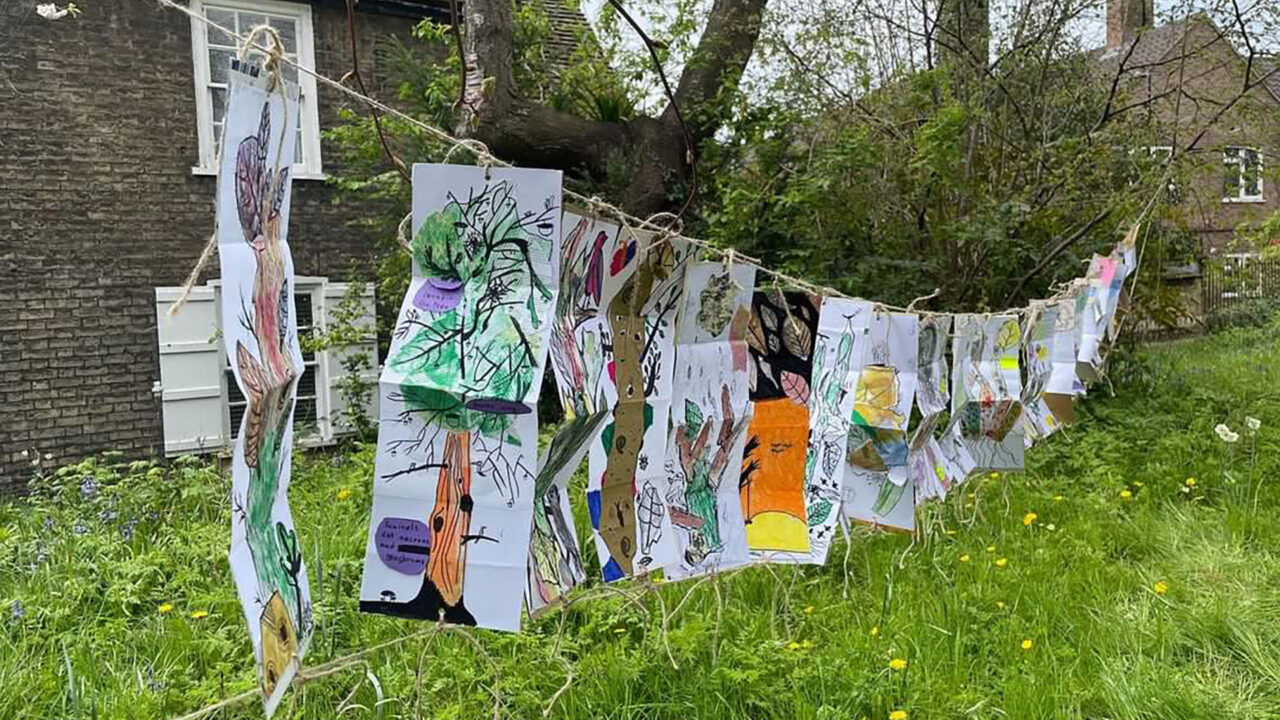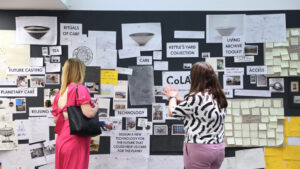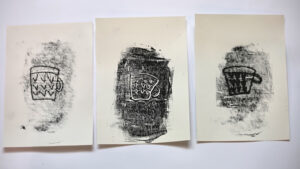- Posted on January 16th, 2024
Kettle’s Yard – The Wild Escape & Carbon Literacy Training

Kettle’s Yard is the University of Cambridge’s modern and contemporary art gallery.
Learning & Community
Kettle’s Yard was delighted to be part of The Wild Escape, a nationwide project which invited primary school children (ages 7-11) to explore nature with their local museum and create an artwork imagining a natural habitat. We partnered with Chesterton Primary School and worked with artist facilitator Jacquie Campbell to investigate the trees on our doorsteps and their importance to our ecology. 381 participants in total took part in the project.
The project began with a hybrid session where students explored the Kettle’s Yard House with our Learning team with a focus on nature and found objects in the collection. The virtual visit allowed the school to reduce their carbon footprint. The students then explored their own playground at Chesterton Primary School through new eyes alongside Jacquie. Whilst exploring the nature in their playground, the children also learnt how they can care for habitats and living things. Once back in the classroom, students created concertina books to share what they had discovered about their chosen tree and the creatures that might live inside, under or on it. They created a forest of books which was displayed at Kettle’s Yard on Earth Day 2023.

One teacher said that as a result of taking part in the project they now have: “recognition of how to make better use of recycled materials and how to exploit the materials they already have in school.”
“I hope my tree will encourage other children to explore nature in the future!” said a student who took part in the project.
The project changed our perspective towards how we use recycled materials for workshops. After the pandemic lockdowns, we sensed that audiences were fatigued from creating with recycled materials whilst making do with things at home and largely focused on making with specialist resources. However, the response from the children and teachers was significantly positive about reusing and rethinking the materials they had in their classroom, and the added value of working with an artist and their specialist skills of reimagining and looking again at materials and the variety of their uses. This has given us the confidence to spotlight this more going forward with specialised public programme events focusing on sustainability.
Sustainability was a feature – although not the main aim – of another of our community projects, CoLAB, held at Kettle’s Yard from July to September 2022. It aimed to identify and test out new possibilities for Kettle’s Yard to act as a bridge between the local communities of North Cambridge, contemporary arts practice, and research being conducted at the University of Cambridge. Kaitlin Ferguson, an artist with social practice, then hosted a series of workshops, open days, and displays in the Clore Learning Studio at Kettle’s Yard to explore the themes of care, access, work, and technology through art and creativity with local community members. 18 sessions were delivered with 232 participants in total.
A learning for us from the project was how we can ‘build in’ sustainability and make it part of our everyday work practices. The fact that we had a table for people to take away any materials or resources for junk modelling is something we can take forward. The public were inspired by Kaitlin’s idea of 3D printers, and were enthusiastic to use recycled wood, waste coffee grinds from the cafe and even chocolate to great effect. It made us value the knowledge of materials that artists have and their creativity, curiosity and experimentation on what materials can do.
Kaitlin highlighted that she also developed a deeper interest in the collection, which allowed her to bring out new stories in her practice: “I was able to learn about these objects and stories…it was amazing to just get lost in stories. That experience was really helpful as a facilitator and has also allowed me to look at the collection through new lenses.”

Carbon Literacy Training
Since March 2023 a team of colleagues from across the University of Cambridge Museums (UCM) have been working together to pilot the delivery of peer-to-peer accredited Carbon Literacy training. The whole group has undertaken Carbon Literacy training run by the national Carbon Literacy Project. The training toolkit used focuses specifically on museums and collections and was developed by the Carbon Literacy Team at Manchester Museum and Museum Development North West.

From September 2023 we will be rolling out Carbon Literacy training to all staff at Kettle’s Yard, and colleagues within the UCM consortium. We know that there is often a huge knowledge gap when it comes to sustainability, so we hope that Carbon Literacy training can provide a space to learn and develop our skills and understanding as an organisation. From there, we would like to see sustainability and carbon literacy become a key part of decision making across the organisation when it comes to use of materials, exhibitions, transport and more.
Working together with colleagues across the UCM has already opened conversations about sharing resources such as exhibition materials, office equipment and storage spaces. It has also allowed us to share ideas about what we as an individual museum are already doing, which in turn can be taken back to other museums. We hope that as we roll this out we will continue to work together to improve our carbon output as a consortium within Cambridge and the University, as well as individual museums.

This case study was written by Kettle’s Yard

